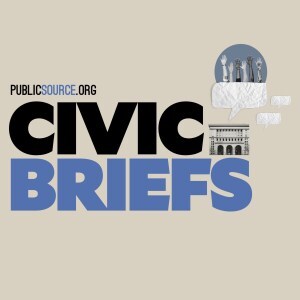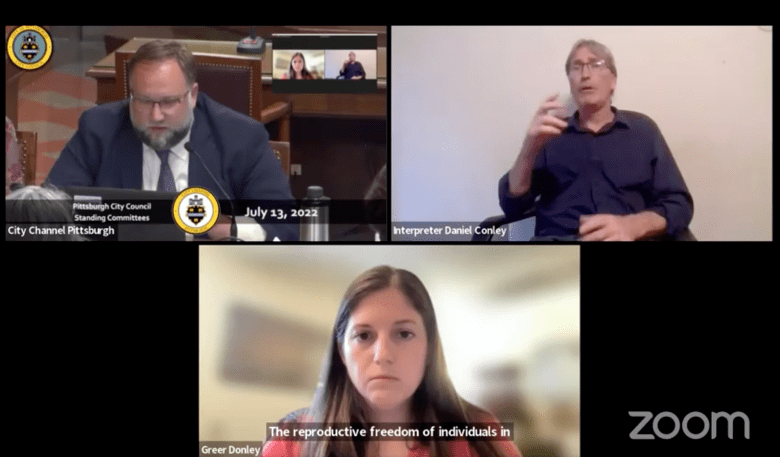Update (7/19/22): City Council gave final approval to three bills to protect abortion services in Pittsburgh on Tuesday, voting 7-0 on each. There was little discussion on two bills, but one was amended before the final vote. The bill to ban deceptive advertising by so-called crisis pregnancy centers was amended to include a definition for deceptive advertising that mirrors one already outlined in state law. The amendment also created a complaint process and instructions for the city to refer violations to the District Attorney’s office.
The three bills passed unanimously, with Councilman Ricky Burgess absent and the District 5 seat vacant. The bills will now go to Mayor Ed Gainey’s desk for signature.
Reported 7/13/22: Pittsburgh City Council preliminarily approved a package of three bills that would increase protection for abortion services in Pittsburgh, with a final vote expected Tuesday.
Councilman Bobby Wilson introduced the bills during council’s meeting on June 28, just five days after the U.S. Supreme Court overturned constitutional protection for abortion services nationwide. Councilwoman Erika Strassburger is the cosponsor.

“We have states around us that are outright banning the reproductive freedom of individuals in their own state, so it’s just important that we protect people that are seeking health care and individuals providing health care,” Wilson said.
The first bill would protect abortion providers in Pittsburgh from out-of-state investigations or prosecutions regarding the care they provide to out-of-state patients. It would also shield city officials from having to comply with out-of-state investigations into legal abortions in Pennsylvania, unless required by court order or state or federal law.
Sue Frietsche, a staff attorney and interim co-director of the Women’s Law Project who helped Wilson draft the legislation, called the bill the “heart of the package,” referencing efforts in other states that have already banned abortions to punish their residents who travel to receive abortions in states where it’s legal and the healthcare providers performing services.
“I have doctors calling me saying, ‘Am I going to go to jail for practicing legal medicine under the laws of our state?’ That cannot happen in this city,” Frietsche said.
Gov. Tom Wolf issued an executive order yesterday to ensure out-of-state residents can enter Pennsylvania to receive reproductive healthcare services. Frietsche said the first bill would protect city level actors who would not be covered by Wolf’s order.
If abortions ever become illegal in Pennsylvania, the second bill would instruct law enforcement officials to treat abortion-related crimes as a low priority. Council amended the bill to define the abortion-related crimes that law enforcement officials would deprioritize enforcing — notably excluding “buffer zone” laws that protect providers and patients from facing confrontations on the sidewalks near clinics that offer abortions.
Greer Donley, a professor at the University of Pittsburgh School of Law who helped Wilson draft the package, noted that the bill should not conflict with state or federal law. She explained that it’s only instructing the city to deprioritize enforcement of abortion-related crimes, not entirely forego enforcement. She also mentioned that another Pennsylvania city, Radnor, has enacted a similar law.

The third ordinance would prevent limited services pregnancy centers, sometimes known as crisis pregnancy centers, from knowingly spreading misleading information about pregnancy health care. Such centers have come under fire for dissuading people seeking abortions.
Council President Theresa Kail-Smith, Councilman Daniel Lavelle and Councilman Anthony Coghill abstained from voting on the third bill, citing concerns about it infringing on free speech and lacking an enforcement mechanism.
The council members referenced public comment yesterday from Pastors Jay Gilbert and Tiffany Gilbert, founders of Voices For The Unborn Pregnancy Center. The pastors said they believed the bill would qualify as censorship of pregnancy resource centers.
Donley said the third bill would not violate freedom of speech because it will only apply to pregnancy centers that knowingly spread false information about reproductive health care.
“This is just saying you can’t lie to people, that’s it,” Donley said.
With three abstentions and one seat open due to Corey O’Connor’s resignation from council to become the Allegheny County Controller, it’s unclear whether the third bill will pass the final vote on Tuesday.
Abortion services are legal in Pennsylvania up to the 24th week of pregnancy, but some state legislators are seeking to curtail abortion rights. The Pennsylvania Senate and House passed a bill on July 8 that began the process of amending the state constitution to explicitly state there is no right to abortion and no guarantee that taxpayer funding can be used for abortions. The amendment must pass both chambers of the state Legislature again during the 2023-24 session and receive approval from a majority of voters before it could take effect.
Wolf has blocked abortion restrictions throughout his seven-year tenure, but with his term coming to an end in January, the future of abortion access in Pennsylvania remains uncertain.
States neighboring Pennsylvania’s western border are considering abortion restrictions, with West Virginia’s only abortion clinic ceasing its services and Ohio lawmakers introducing a bill to ban abortion from conception, unless the mother’s life is at risk.
Amelia Winger is a reporting covering health at PublicSource. She can be reached at amelia@publicsource.org.
This reporting has been made possible through the Staunton Farm Mental Health Reporting Fellowship and the Jewish Healthcare Foundation.






